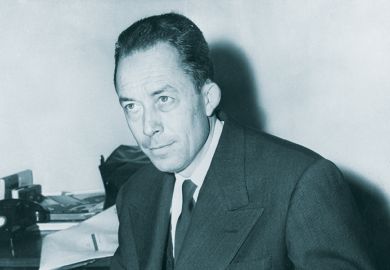In Truth and the Reality of God , Ian Markham is determined to uphold the truth claims of Christianity. He sees two essential requirements for this. The first is to reinstate natural theology in place of the fideism of Karl Barth and his postmodern disciples. Central to this task is a philosophical defence of "critical realism", without which no claim to describe the true state of affairs in the world has any basis. Here he draws heavily on Alasdair MacIntyre. He shows that philosophical realism depends upon the assumption that the world is intelligible. This provides the launch pad for his second assault, against atheism.
Markham finds an unlikely ally in Friedrich Nietzsche. Nietzsche saw with great clarity that God and realism go hand in hand, and drew the conclusion that since God was dead, so was the possibility of making truth claims. The atheist statement "There is no God" cannot be "true" in an absolute sense. Therefore, Markham concludes, atheism is incoherent. We are forced to choose between the rational theism of Aquinas and the nihilism of Nietzsche.
It's all good swashbuckling stuff, and Markham carries you along with his verve and enthusiasm. What he fails to do is to provide a reason for choosing Aquinas rather than Nietzsche. He rightly disposes of Swinburne's deism but is too quick to accuse Cupitt of reducing the universe to "impersonal atoms". Markham is right to say that the world we humans inhabit is personal, but his covert reductionist tendencies cause him to miss the obvious explanation for this: that we humans are personal.
He accuses anti-realists such as Cupitt of being "slippery" when it comes to saying whether or not they believe in a world of objects. But Markham's own arguments take on some aspects of the soap in the bath when he talks about "reality". First he defines this as "the stable world external to the mind and not dependent on the mind". But in the next sentence he declares that this world includes all "factsI not only physical but mental". How can a mental fact be mind-independent? On top of this, he states that the realism he defends is primarily concerned with making sense of "reality as experienced". In other words, Kant's phenomenal world. Elsewhere he sets much store by the existence of the "external world" to bolster realism, in contexts that clearly refer to the phenomenal world, rather than the mind-independent world of things in themselves. Case not proven.
Stephen Clark's thesis in God, Religion and Reality is much the same as Markham's. Natural theology and realism are defended against postmodern versions of Christianity, and traditional theism is claimed to be the necessary foundation for any metaphysical statements: "Even atheists, as long as they are rational ones, rely on Christian axioms." But there the similarity ends. Where Markham entertains his readers, leavening his serious argument with humour and an easy style, Clark is heavy-going and inclined to hector his audience rather than woo them.
Part of the problem is his heavy reliance on quotations. A page chosen at random has an indirect account of the views of Thomas Burnet (d. 1715) plus direct quotations from Eilenberger (who?), Chesterton and Plotinus. The last two, together with Augustine, Aquinas and Berkeley, crop up again and again. These endless quotations seem to be a substitute for engaging directly with contemporary opponents.
At one point he does tackle head-on the claim that "reality" is created by language. His counter-attack centres on one quotation from Milton, two from Orwell and another from Chesterton. Worthy authors all, but none of them ever read Rorty or Cupitt, Clark's named targets here. Clark does then make one substantial point of his own: that replacing certain words by others devoid of moral force, "termination" for abortion, "embryo" for unborn child, can be an illegitimate means of evading moral responsibility. True. But he fails to mention cases where the same device has been used to opposite effect, by feminists or animal rights activists, to bring hitherto unrecognised ills into the moral spotlight. If anything, the examples serve to strengthen his opponents' case: changing the language does change the "reality".
The positive part of the book's thesis depends upon a form of the ontological argument: there is truth, both intellectual and moral, which necessarily exists and is the final explanation for any finite thing's existence. Without it no proposition can be true. It is a shame that Clark is so confrontational. If he is right, and rational "atheism" in fact entails theism, then why treat those who call themselves atheists as enemies? Why not simply say to them: "We have no quarrel. The 'God' whose existence you deny you do well to deny. It is an object among other objects and I deny it also. The necessary ground of all rational thought, on which you and I both depend to make sensible statements, that is what I mean by God."
It was a happy chance that led me to open George Pattison's book next: it has not a single citation. Indeed, it reads more like a personal letter than the work of scholarship it undoubtedly is. Nor is it just the form of his book that differs from Clark's. As his title suggests, Pattison believes old-style theology is finished, because it was tied irrevocably to ontology and metaphysics. To proclaim the end of theology, he says, is simply to declare that theologians can no longer make good their claim to "speak truthfully about what is Really Real". In place of obsolete theological monologue he proposes a form of open dialogue as the way to approach the task of thinking about God.
Unlike Martin Buber, Pattison does not see dialogue as an encounter in which God will somehow be made present. This is because, for him, God "is not a name for a reality that is already present in any definitive way, but for a possibility that first arises out of the process of seeking understanding on the path of dialogue". He underlines this by admitting that the project might be better termed "thinking towards God" rather than "thinking about God".
Pattison draws heavily on existentialists, although he distances himself from them, especially from any attempt to use their approach as a back door to ontology. He also acknowledges a debt to the radical postmodernists but again resists being drawn into their company, except for conversation. The dialogue Pattison commends is not just between different religious traditions or academic disciplines but between our own pasts and futures. This offers a creative way to tackle the problems of relativism and of past traditions, which he argues we must approach as "participants" rather than "spectators".
Any reader looking for positive statements about God will be frustrated by Pattison's lack of "a determinate body of doctrine". Anyone willing just to stroll as he shares his thoughts is in for an illuminating treat.
Religion arose from a meeting of Latin/Catholic European philosophers on the Isle of Capri in 1994. The group had no native English speaker and only one German/Protestant. They met under the chairmanship of Gianni Vattimo, with Jacques Derrida as the keynote speaker to ponder the widespread phenomenon of "religious revival" over a century after Nietzsche proclaimed the death of God.
Nearly half the book is taken up by Derrida's contribution on "Faith and knowledge". It is playful, irritating and impressive by turns, defying summary. One focus of his argument is the "strange alliance of Christianity, as the experience of the death of God, and tele-technoscientific capitalism", for which he coins the term "globalatinisation", a development he sees as both "ultra-powerful and in the process of exhausting itself".
Among the other contributions, admirably translated by David Webb, Eugenio Trias's on the significance of symbol as event, "above all the sensible and manifest revelation of the sacred", was particularly clear. I commend the collection as an antidote to an over Anglo-Saxon theological diet.
Anthony Freeman is a priest in the Church of England and managing editor, Journal of Consciousness Studies .
Religion
Editor - Jacques Derrida and Gianni Vattimo
ISBN - 0 7456 1833 2 and 1834 0
Publisher - Polity
Price - £45.00 and £12.95
Pages - 211
Translator - David Webb
Register to continue
Why register?
- Registration is free and only takes a moment
- Once registered, you can read 3 articles a month
- Sign up for our newsletter
Subscribe
Or subscribe for unlimited access to:
- Unlimited access to news, views, insights & reviews
- Digital editions
- Digital access to THE’s university and college rankings analysis
Already registered or a current subscriber? Login



